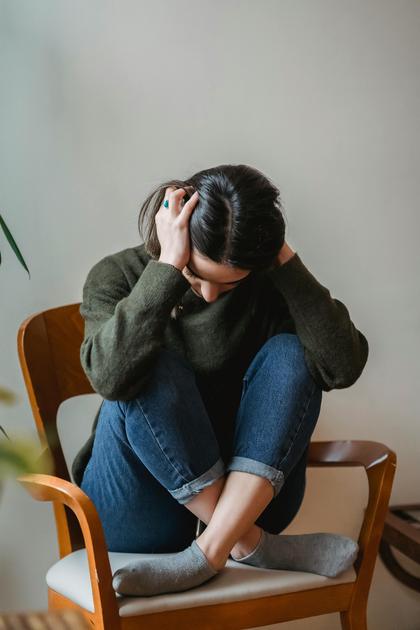Chronic Anxiety in Women: Uncovering Causes and Natural Solutions
Are you a woman over 30 struggling with chronic anxiety, feeling overwhelmed by life’s demands? You’re not alone. Many women face anxiety, often coupled with issues like fatigue and hormonal imbalances. In this article, we delve into the causes of chronic anxiety including the role of hormones, and explore natural solutions that can help you regain control and find tranquility. Let’s embark on this journey together, identifying the silent battles many women face and discovering soothing strategies to foster well-being.
Understanding Chronic Anxiety in Women
Chronic anxiety affects many women, particularly those over 30. It is characterized by persistent worry and fear that disrupt daily life. Many women might feel like they are always on edge, unable to relax or enjoy activities that once brought them joy. It’s important to recognize that these feelings of anxiety are not just a personal struggle; they are often linked to deeper issues and can accumulate over time, leading to debilitating mental and physical health challenges.
Often, women find themselves juggling multiple roles: professionals, caregivers, and partners. With these responsibilities, it is common to neglect mental health, allowing anxiety to flourish in silence. Understanding the roots of this anxiety can be empowering and the first step toward healing.
The Role of Hormones in Anxiety Disorders
Hormones play a critical role in women’s mental health. Fluctuations in hormones, especially during menstrual cycles, pregnancy, perimenopause, and menopause, can significantly impact mood and anxiety levels. For instance,:
- Estrogen: This hormone is known for its mood-regulating properties. When estrogen levels drop, many women may experience increased anxiety, irritability, and sadness.
- Progesterone: Often referred to as the calming hormone, low levels can lead to feelings of unease and anxiety.
- Cortisol: Known as the stress hormone, chronic high levels can lead to heightened anxiety and a sense of overwhelm.
Understanding how these hormonal changes affect mental health can help women take proactive steps to manage their anxiety effectively.
Common Triggers of Anxiety in Everyday Life
Identifying anxiety triggers is essential in managing symptoms. Common triggers for women may include:
- Work Stress: Deadlines, workplace dynamics, or job insecurity can heighten feelings of anxiety.
- Relationship Challenges: Issues in personal relationships, whether with partners, friends, or family can contribute to anxiety.
- Life Changes: Major life events, such as moving, changing jobs, or dealing with loss, can trigger anxiety.
- Health Concerns: Chronic illness or ongoing health issues can be a persistent source of worry.
By recognizing these triggers, women can develop coping mechanisms to navigate daily stressors more effectively.
How Fatigue Affects Mental Health
Fatigue is more than just physical tiredness; it’s deeply tied to mental health. When women experience chronic fatigue, it can lead to:
- Increased Irritability: Lack of sleep or rest can make anyone feel more on edge, increasing anxiety levels.
- Decreased Motivation: Fatigue can sap the motivation needed to engage in activities that help reduce stress or anxiety.
- Impaired Cognitive Function: Fatigue affects concentration and decision-making, which can enhance feelings of anxiety.
It’s crucial for women to prioritize rest and establish healthy routines that support their mental and physical wellness.
Natural Remedies for Managing Anxiety
There are several natural remedies women can explore to help manage anxiety:
- Herbal Supplements: Herbs like chamomile, valerian root, and lavender have calming properties.
- Essential Oils: Aromatherapy with oils such as lavender or bergamot can provide soothing effects.
- Deep Breathing Exercises: Focusing on breath can help ground thoughts and reduce anxiety.
Finding what works best can be a personal journey, and experimenting with different remedies can lead to significant breakthroughs in managing anxiety.
The Importance of Support Systems
Having a support system is vital in managing anxiety. Women should aim to surround themselves with positive influences, whether through:
- Friends: Trusted friends can provide a listening ear and emotional support.
- Support Groups: Connecting with others facing similar challenges can create a sense of community.
- Family: Open communication lines with family members foster deeper connections and understanding.
The strength found in sharing experiences can alleviate feelings of isolation and promote healing.
Mindfulness and Relaxation Techniques
Incorporating mindfulness can drastically improve mental health. Simple techniques include:
- Mindful Meditation: Dedicate a few minutes each day to sit quietly and focus on the breath.
- Yoga: Practicing yoga combines physical movement with meditation, creating a holistic approach to wellness.
- Journaling: Writing thoughts down can clarify feelings and reduce anxiety.
These practices encourage present-moment awareness and can significantly reduce anxiety levels.
Nutrition’s Impact on Anxiety Levels
What you put into your body affects how you feel. Nutrition plays a significant role in mental health. Key considerations include:
- Balanced Diet: Eating a variety of fruits, vegetables, whole grains, and lean proteins can help stabilize mood.
- Hydration: Dehydration can affect energy levels and the ability to concentrate, making anxiety worse.
- Avoiding Excess Sugar and Caffeine: Both can lead to energy crashes and heightened anxiety levels.
Considering dietary habits and making small changes can create a foundation for better mental well-being.
Physical Activity as a Stress Reliever
Regular physical activity is one of the most effective ways to combat anxiety. Exercise releases endorphins, the body’s natural feel-good hormones. Strategies include:
- Finding Enjoyable Activities: Whether it’s dancing, hiking, or yoga, discover what feels good.
- Establishing a Routine: Make exercise a daily habit, even if for short durations.
- Joining Classes: Group classes can provide motivation and create a sense of belonging.
Physical activity not only helps reduce anxiety but also builds confidence and self-esteem.
Embracing a Step-by-Step Approach to Wellness
Managing chronic anxiety is a journey, not a race. Embrace small steps that lead to significant changes. Here are some steps to consider:
- Set Realistic Goals: Focus on achievable milestones that create a sense of accomplishment.
- Track Progress: Keeping a journal of experiences and feelings can help clarify what works and what doesn’t.
- Celebrate Small Wins: Acknowledge achievements, no matter how small, to motivate personal growth.
Remember that it is indeed possible to improve symptoms and challenges by following a simple step-by-step method that has helped many other women. You are destined to overcome and thrive just like they have. Discover your pathway to wellness today!













